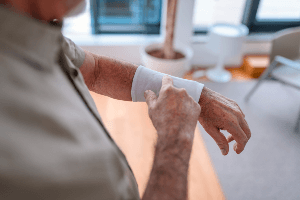Are Nursing Homes Liable if One Resident Attacks Another?
Posted on behalf of Jeff Pitman on June 22, 2022
in Nursing Home Abuse
Updated on April 24, 2024
 Abuse in nursing homes is often perpetrated by staff members and caregivers who work in the facility. There are also situations where residents are abused by other residents.
Abuse in nursing homes is often perpetrated by staff members and caregivers who work in the facility. There are also situations where residents are abused by other residents.
In fact, resident-on-resident abuse is so prevalent that many nursing homes consider these attacks part of everyday life. Despite the normalization of these actions by staff, abuse of any kind should never be tolerated.
If your loved one suffered an injury at the hands of another nursing home resident while in a long-term care facility, our Wisconsin nursing home abuse lawyers are prepared to help you pursue the compensation you need for your loved one’s medical expenses and other damages.
Why Do Residents Attack Others in Nursing Homes?
There is no definitive answer for why nursing home residents may attack others. However, there are some common underlying factors that may contribute to these attacks, including:
- Dementia
- Patients with mental illness
- Certain medications
- Post-Traumatic Stress Disorder (PTSD)
- Substance abuse
- Overstimulation
Sometimes, patients who attack others are experiencing abuse at the hands of someone else. These victims may not have a way to verbally express the abuse they are experiencing and instead resort to violence toward others.
For example, a non-verbal, abused resident who feels his or her space is being invaded by another resident may lash out due to his or her inability to communicate a problem.
Conflicts, such as one-off arguments or disputes, may also lead to violence between residents.
What Responsibility Does the Nursing Home Have to Prevent Resident-on-Resident Attacks?
The nursing home where your loved one is being cared for has a duty to keep its residents safe. This includes protecting residents from abuse, even if it occurs at the hands of another resident.
Some steps nursing homes should take to keep resident-on-resident abuse under control include:
- Having appropriate staffing levels
- Keeping resident numbers at a manageable level
- Ensuring that resident-on-resident attacks are not normalized
- Completing thorough initial assessments of potential residents
If a resident is later determined to be prone to violent outbursts, the nursing home facility has a duty to take measures to ensure other residents’ safety. This includes some, but not all, of the following measures:
- Closely monitoring the resident
- Identifying factors that may trigger violence
- Providing proper training for staff
- Developing an individualized care plan for the resident
When a nursing home fails to take these steps, or more, to prevent resident-on-resident attacks, the facility may be held liable for your loved one’s damages.
Proving Nursing Home Negligence Resulted in Resident-on-Resident Abuse
If you suspect your loved one suffered abuse from another nursing home resident due to the facility’s negligence, building a case for compensation requires proof. Our attorneys are prepared to help you gather evidence of how the abuse occurred and whether it could have been prevented had the nursing home acted appropriately.
Our attorneys can help you request surveillance footage, documentation and other information to help build a strong case proving the failures of the nursing home resulted in the resident-on-resident attack.
In addition to proving the facility’s negligence, you must also prove it directly resulted in your loved one’s injuries. Our attorneys are prepared to help you gather the necessary medical records and testimony from your loved one’s physician to prove the injuries were a direct result of the abuse.
How Common is Resident-on-Resident Abuse in Nursing Homes?
According to the National Center for Victims of Crime (NCVC), 22 percent of abuse in nursing homes is resident-on-resident abuse. This includes emotional, physical and sexual abuse.
In a study conducted by Weill Cornell Medical College and Cornell University, researchers found that one in five nursing home residents were involved in at least one hostile and aggressive encounter with one or more fellow residents over the previous four weeks.
Researchers have concluded that individuals who are most likely to commit abuse against another resident are younger, less cognitively and physically impaired and prone to disruptive behavior compared to other cohabitants. These individuals undoubtedly become a problem when confined to such close and crowded quarters, such as a nursing home.
Call PKSD Today for Legal Help for Nursing Home Abuse
If you suspect your loved one is experiencing abuse in a nursing home, you should strongly consider calling PKSD today. We offer a free consultation to discuss your claim. There are no fees while we investigate your case, and we only get paid if we win. There is no risk to you.
We have many years of experience helping nursing home abuse victims in Wisconsin, Illinois, Iowa and New Mexico.
Call 414-333-3333 to schedule a confidential consultation.






